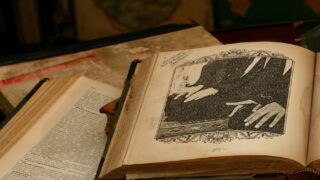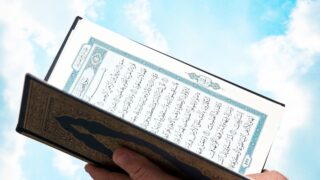Ubayy (May Allah be pleased with him) was one of the chosen few who transcribed the Qur’anic revelations and had his own Mus-haf. He wrote letters for the Prophet Mohammad (Peace be upon him) as a scribe. He was one of about twenty-five Companions who had memorised the entire Qur’an by heart at the time of the Prophet’s (Peace be upon him) death. His recitation was so beautiful, and his comprehension so deep, that the Prophet (Peace be upon him) encouraged his Companions to learn the Qur’an from him and three others.
Narrated Qatada: Anas said, “The Qur’an was collected in the lifetime of the Prophet by four (men), all of whom were from the Ansar: Ubai, Mu`adh bin Jabal, Abu Zaid and Zaid bin Thabit.” I asked Anas, “Who is Abu Zaid?” He said, “One of my uncles”[1].
Narrated `Abdullah bin `Amr: I heard the Prophet saying, “Learn the recitation of Qur’an from four persons: Ibn Mas`ud, Salim, the freed slave of Abu Hudhaifa, Ubayy and Mu`adh bin Jabal”[2].
Narrated Masruq: `Abdullah bin Masud was mentioned before `Abdullah bin `Amr who said, “That is a man I still love, as I heard the Prophet saying ‘Learn the recitation of Qur’an from four from `Abdullah bin Mas`ud – he started with him—Salim, the freed slave of Abu Hudaifa, Mu`adh bin Jabal and Ubayy bin Ka`b”[3] .
Anas reported Allah’s Messenger (May peace be upon him) as saying to Ubayy b. Ka’b: Aliah has commanded me to recite to you:” Those who disbelieve were not…” (al-Qur’an, xcviii. 1). (surah al-Bayyinah), He said: Did He mention me by name? He (the Holy Prophet said): Yes. Upon this he shed tears (of gratitude)[4].
According to Imam Bukhari‘s narration, one of the subnarrators added an addition to the end of the hadith. Qatadaa added: I have been informed that the Prophet (May peace be upon him) recited: ‘Those who disbelieve among the people of the Scripture,” (al-Bayyinah (97)…to Ubayy[5].
Imam Abu Zakariyah Yahya al-Nawawi mentioned the following commentary on this hadith in his commentary on Sahih Muslim:
This hadith has numerous advantages:
One advantage is being encouraged to recite the Qur’an by someone who is skilled at it, someone of knowledge and virtue. That is true even if the person reciting is more virtuous than the person being recited to.
Another advantage is the great merit of Ubayy, which the Prophet recited to him, and no one else is known to share this distinction.
Ubayy also has the advantage of being specifically mentioned by Allah for this high station.
Another advantage from this hadith is that one can cry out of joy and happiness when he receives good news or is bestowed with a high honour.
In response to Ubayy’s question, “Did Allah mention me by name to you?” A point is raised: it is possible that Allah commanded the Prophet to recite to any member of his ummah without specifically mentioning Ubayy, so Ubayy wanted to know if Allah had specifically mentioned him or if he had simply commanded the Prophet to recite to someone else. This teaches us that when something is ambiguous, it is legal to seek clarification.
Scholars have offered various explanations for why the Prophet was instructed to recite to Ubayy, but the most persuasive argument is that it was to set a precedent and example for this ummah in reciting to people of virtue who excelled in Qur’an recitation, as well as to teach this ummah the etiquette of reciting the Qur’an so that no one could reject these points.
Others argue that this was done to demonstrate Ubayy’s high status and that he was one of the best people to learn the Qur’an from, and that the Prophet regarded him as a leader and model for reciting the Qur’an.
This particular surah was chosen because it is brief while containing many principles pertaining to the fundamentals of the religion and its branches, and important matters of this religion, such as sincerity and heart purification[6].
The Companions and Followers who learned the Qur’an from Ubayy ibn Ka’b
There were numerous Companions who learned the Qur’an from Ubayy Ibn Ka’b. Among them were Abu Hurayrah, ibn ‘Abbaas, ‘Abdullah ibn al-Saa’ib, and many others[7].
There were several Followers who learned from him, including ‘Abdullah ibn ‘Ayyaash ibn Abi Rabee’ah, ‘Abdullah ibn Habeeb, Abul ‘Aaliyah al-Riyaahi, and Abul ‘Aaliyah al-Sulami.
And the chains used by nine of the ten Imams of the Mutawaatir Qiraat that are still in use today can be traced back to this reciter leader, Ubayy (May Allah be pleased with him).
Those nine Imams are:
Imam Naafi’, Abu Ja’far, ibn Kathir, Abu ‘Amr, Ya’qub, ‘Asim, Hamzah, al-Kisaa’i, and Khalaf.
By Dr. Mohamed Abdelmonem Elsayed Khalil*
[1] Sahih Imam Al-Bukhari, Book 63, Hadith 3857
[2] Sahih Imam Al-Bukhari, Book 63, Hadith 3853
[3] Sahih Imam Al-Bukhari, Book 63, Hadith 3855
[4] Sahih Muslim, The Book of Prayer (Travellers) – Hadith 1900
[5] Sahih al-Bukhari, Book 65, Hadith number: 4960
[6] Sahih Muslim with the commentary by Imam Nawawi (Al-Minhaj), (6/86).
[7] Briefly from a book Ghaayati an-Nihayah fi Tabaqaatil-Qurra’ of Imam Ibn al-Jazari.

















